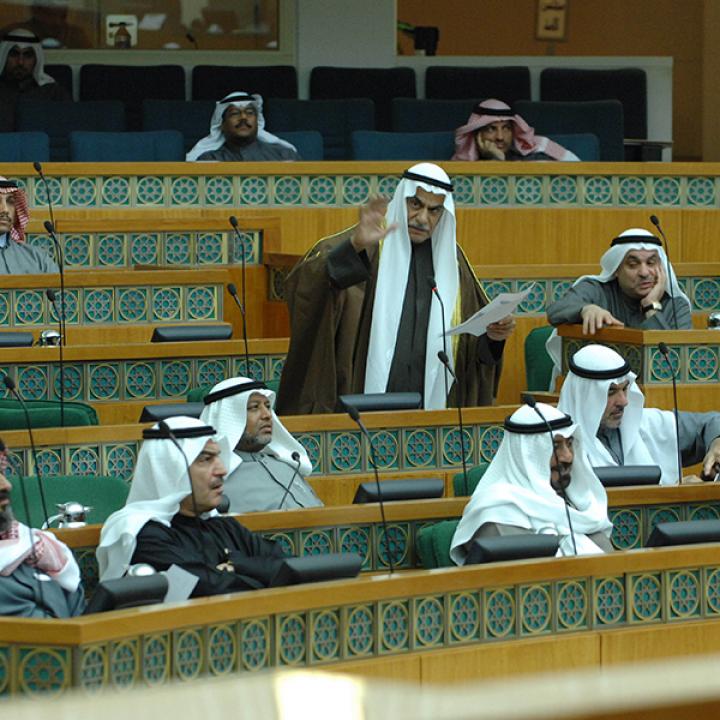
- Policy Analysis
- Fikra Forum
New Kuwaiti Poll Shows Mostly Positive Views On U.S. Policy Push, But Some Splits

October 25, 2017
As Secretary of State Tillerson returns from the Middle East, where he focused on challenges from Iran and intra-Arab divisions, a new poll in Kuwait reveals a mixed yet largely favorable picture of popular attitudes on such issues in that small but strategic Gulf state.
On Iran’s “recent policies in the region,” Kuwaiti public opinion is as solidly negative as the Trump administration: 85 percent of Kuwaitis give Iran’s behavior an unfavorable rating today. This marks a further decline for Tehran since the previous poll, in September 2015, when the figure was 74 percent negative. Notably, even among Kuwait’s substantial Shia minority, the majority (63 percent) now voice disapproval of Iran’s policies. On the sensitive demographic issue of sectarian distribution among Kuwait’s roughly 1.5 million citizens, the survey pinpoints the proportion of Shia affiliation at 28.6 percent. Kuwait’s government is thus on solid ground in continuing to take steps against Iranian subversion.
Iran’s regional allies also receive highly unfavorable ratings from both Sunni and Shia Kuwaitis. Hezbollah is viewed negatively by a remarkable 94 percent of the country’s Sunnis -- and by an even more remarkable 85 percent of the Shia. The proportion for Kuwaitis as a whole is 91 percent negative toward Hezbollah, registering a parallel downward trend from the 78 percent recorded two years ago. Similarly, the Houthis of Yemen get poor reviews from 92 percent of Kuwaiti Sunnis, and 72 percent of Kuwaiti Shia.
On the current intra-Arab dispute over Qatar, which Kuwait (like the United States) is attempting to mediate, the Kuwaiti public takes a correspondingly moderate view. The large majority (77 percent) rejects the boycott of Qatar, as pursued by the Arab quartet of Saudi Arabia, the UAE, Bahrain, and Egypt. And exactly the same high percentage of Kuwaitis agree that “the best outcome is a compromise, in which all parties make some concessions to each other to reach a middle ground.” This too is generally in line with U.S. initiatives on this issue.
More surprisingly, Kuwaitis are largely favorably disposed to a mediating role in a different regional dispute: the Israeli-Palestinian conflict. Despite strong expressions of anti-Israel sentiment by some Kuwaiti politicians, 60 percent of the country’s citizens agree that “Arab states should play a new role in Palestinian-Israeli peace talks, offering both sides incentives to take more moderate positions.” Here again this normally aloof Arab public appears broadly receptive to the new U.S. approach on an intractable regional problem. But only a small minority of Kuwaitis, 16 percent, say the time has already come for “Arab states to work with Israel on other issues like technology, counter-terrorism, and containing Iran.”
Overall, asked about their relations with the United States, a slim majority (53 percent) of Kuwaitis say it is important for their country to maintain good ties with Washington. Although this percentage might seem low given the U.S. liberation of Kuwait from Saddam Hussein’s occupation in 1991, it is among the highest in the region, double that among Saudis or Emiratis. And it probably reflects widespread disappointment with subsequent U.S. policies on the Mideast; just one-quarter of Kuwaitis approve of U.S. regional policy as a whole right now. Asked to select their top priority for that policy, Kuwaitis divide evenly among three options: countering jihadi terrorism, containing Iran, and resolving the crisis in Yemen. The Palestinian cause comes in fourth, at 15 percent. Significantly, only 11 percent say the best thing would be for the United States simply to “reduce its interference in the region.”
Despite this generally moderate consensus, the survey also reveals some potentially troubling bones of contention in Kuwaiti society. On a few specific questions, the data show a sharp sectarian divide. For example, asked about maintaining good relations with Iran, 54 percent of the Shia minority say that is important; stunningly, however, a mere 1 percent of their Sunni compatriots agree. Conversely, asked about the Muslim Brotherhood, which operates openly by a different name in Kuwait’s parliament and public life, 37 percent of Sunni Kuwaitis express a positive opinion – but precisely zero percent of their Shia fellow citizens agree with that position.
The good news in these findings is that a majority in both communities agree that “Arabs should work harder for coexistence and cooperation between Sunnis and Shia.” That proposition garners support from 64 percent of Kuwaiti Sunnis, and from 84 percent of the country’s Shia. At a lower yet still significant level of popular endorsement, 32 percent of the Sunnis, and 50 percent of the Shia, favor “interpreting Islam is more moderate, tolerant, and modern direction.” Notably, the overall percentage behind that controversial statement is now double what it was in Kuwait just two years ago.
This poll, completed in early September 2017, was conducted by a reputable, locally licensed regional commercial survey firm, using face-to-face interviews with a representative national sample of 1,000 Kuwaiti citizens, as part of its longstanding market research series. The methodology comprised a standard, stratified geographical probability technique, yielding a statistical margin of error of approximately 3 percent. Given the firm’s professional method, long-term track irreproachable track record, and strict assurances of confidentiality, the findings offer a highly credible and detailed picture of Kuwaiti popular attitudes on these issues today.



